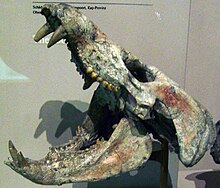Diademodontidae is an extinct family of Triassic gomphodonts. The best-known genus is Diademodon from South Africa. Titanogomphodon from Namibia may also be a member of Diademodontidae.[1] The Chinese genera Hazhenia and Ordosiodon have also been included in the family, but were more recently identified as baurioid therocephalians.[2] Remains of a diademodontid were reported in the Early-Middle Triassic Fremouw Formation in Antarctica,[3] but that specimen was later referred to the trirachodontid Impidens.[4]
| Diademodontids Temporal range: Middle Triassic,
| |
|---|---|

| |
| Skull of the diademodontid Diademodon tetragonus | |
| Scientific classification | |
| Domain: | Eukaryota |
| Kingdom: | Animalia |
| Phylum: | Chordata |
| Clade: | Synapsida |
| Clade: | Therapsida |
| Clade: | Cynodontia |
| Clade: | †Gomphodontia |
| Family: | †Diademodontidae Haughton, 1925 |
| Genera | |
References
edit- ^ Martinelli, A. N. G.; Fuente, M. D. L.; Abdala, F. (2009). "Diademodon tetragonus Seeley, 1894 (Therapsida: Cynodontia) in the Triassic of South America and its biostratigraphic implications". Journal of Vertebrate Paleontology. 29 (3): 852. doi:10.1671/039.029.0315.
- ^ Sun, A. (1991). "A review of Chinese therocephalian reptiles" (PDF). Vertebrata PalAsiatica. 29 (2): 85–94.
- ^ Hammer, W. R. (1995). "New Therapsids from the Upper Fremouw Formation (Triassic) of Antarctica". Journal of Vertebrate Paleontology. 15: 105–112. doi:10.1080/02724634.1995.10011210.
- ^ Tolchard, Frederick; Kammerer, Christian F.; Butler, Richard J.; Hendrickx, Christophe; Benoit, Julien; Abdala, Fernando; Choiniere, Jonah N. (2021-07-26). "A new large gomphodont from the Triassic of South Africa and its implications for Gondwanan biostratigraphy". Journal of Vertebrate Paleontology: e1929265. doi:10.1080/02724634.2021.1929265. ISSN 0272-4634.